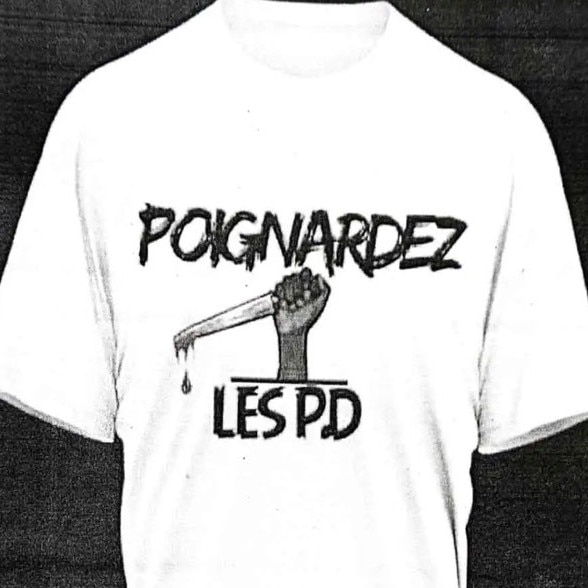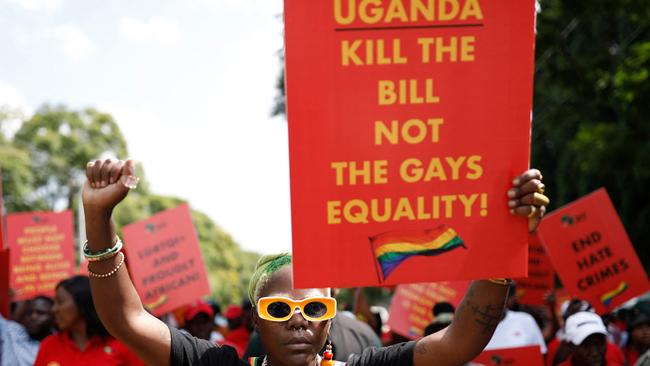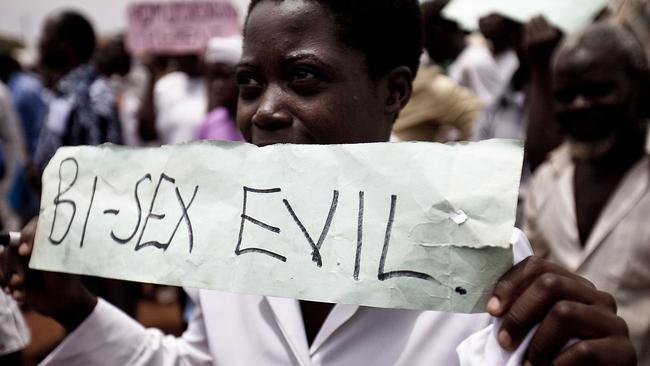‘Stab the f****ts’: Horror as violent, homophobic song goes viral, tops charts in Cameroon
A nation has descended into bloody chaos after a viral song that openly calls for violence and murder topped the charts.

Real Life
Don't miss out on the headlines from Real Life. Followed categories will be added to My News.
Cameroon has long been one of the most dangerous countries for LGBTQ individuals in Africa.
But with the rise of harsh anti-LGBTQ laws sweeping across the continent, there has been an alarming increase in anti-LGBTQ sentiment and violence towards the community in recent months.
This surge, driven by a deeply rooted culture of homophobia and violence against queer individuals, not only highlights the vulnerable position of LGBTQ people in Cameroon but also underscores the wider crisis of persecution spreading across Africa.

In a disturbing new phenomenon, a homophobic song that incites violence and openly calls for the murder of LGBTQ individuals has recently gone viral, topping the charts in Cameroon.
The song Les Nerfs des Boys (Boys Nerves) by Snoopie le Mélodie, a Cameroonian artist, is classified as “murder music”. This genre originated in Jamaica, was founded in 1988 by Jamaican dance hall star Buju Banton, and is known for promoting and glorifying violence against LGBTQ individuals.
The song also features explicit lyrics such as: “poignardez les pédés” (stab the f****ts) and “nous, on déteste les pédés” (we hate f****ts), calling for the murder of queer people, branding them as threats to morality and the nation’s fabric.
The word “pedes” — short for “pedophile” — is a homophobic slur for gay men and is synonymous with “homosexuals” and “f****ts”, since Cameroonias commingle homosexuality with pedophilia.
In promotion of the song release, Snoopy la Mélodie also distributed merchandise of graphic T-shirts with the slogan “poignardez les pédés” (“stab the f****ts”) boldly written on them alongside an image of a bloody dagger. This move encourages and incites the public to attack queer people, possibly killing them with daggers.

The impact of the song has been profoundly damaging for the queer community in Cameroon. It serves as a rallying cry for extremists and stands as a disturbing reminder of the normalisation of homophobia in Cameroonian society.
The song quickly gained viral popularity and sparked a wave of violence across the country. According to human rights organisations, there have been multiple reports of organised gangs of young men wearing the T-shirts and attacking queer people with knives.
Pierre, a student of Cameroon’s University of Douala, told news.com.au that he has been scared for his life ever since the song came out, and that it had been used to threaten his life multiple times.
“I’m scared to leave my room or go to classes anymore because it feels unsafe to do so lately,” he said.
“Whenever my coursemates see me, they start chanting ‘poignardez les pédés’. Last month, they did it to me in public … It was so humiliating that I eventually burst into tears,” the 22-year-old said.
“This whole thing is causing me so much distress and makes me paranoid. A boy in my class even threatened to stab me last month and my department staff did nothing about it.”
Another Cameroonian, Benoit, was also recently stabbed by one of his neighbours who had been taunting him with the song for over a month. He is currently in recovery, while his assailant was never arrested.

There have also been torrents of viral online videos of people singing the song and chanting “poignardez les pédés” (stab the f****ts) in public.
In multiple TikTok posts made by the artist, large crowds can be seen singing the song, while in another video men were filmed making stabbing gestures with their hands as they sing along. Snoopy la Mélodie has recently performed the song at several events, and the crowd sang along word for word.
The virality of the sound is not coincidental. The song taps into deeply held prejudices while exploiting digital platforms to amplify its reach. Social media, often a lifeline for LGBTQ people seeking community, has instead become a weapon of their oppression, with users sharing and celebrating the song as an anthem of hate.
A Facebook user wrote: “On doit tous les brûlé vivant ou même les fouetter avec machette c’est gens m’énerve tellement” (We must burn them all alive or even cut them with a machete these people annoy me so much) in a reply to a post quoting the viral lyrics.


Since its establishment in 1965, Cameroon’s original Penal Code did not criminalise homosexuality. However, amendments made in 1972 introduced provisions that prohibited consensual same-sex relations, imposing penalties such as five-year prison terms and fines. This law has served as a pretext for widespread violence, extortion and discrimination against queer individuals.
Authorities are also contributing to the anti-LGBT atmosphere through arbitrary arrests, harassment and violence against individuals suspected of being LGBTQ. Human rights organisations such as Amnesty International and Human Rights Watch have reported that over 50 individuals were arrested and detained on charges of homosexuality in the last five months. Additionally, 17 cases of violent attacks against individuals perceived to be homosexuals have been recorded, including six fatal murders.
In October, two gay men were publicly lynched to death after they were accused of engaging in homosexual intercourse in Douala. The country’s anti-LGBTQ sentiment stems from conservative cultural and religious beliefs that view homosexuality as immoral and “un-African”.
This view has been reinforced by political leaders and religious institutions whose inflammatory rhetoric further legitimatises bigotry and violence.


The human rights group ADEFHO (the Association for the Defence of Homosexuals) filed a complaint on November 19, requesting an investigation into the songwriter for inciting hate and murder. Alice Nkom, the president of ADEFHO and a Cameroonian lawyer, warned that “A song that calls for the killing of homosexuals circulates freely, while citizens are attacked daily, and the state remains passive”.
ADEFHO was joined by four other French LGBTQ+ rights organisations — Familles LGBT, Mousse, STOP Homophobie, and ADHEOS — that filed another complaint in a Paris court on December 12 against the Cameroonian singer Snoopy la Mélodie and his producer, Gouvernement Prod. They stated the song goes beyond the framework of freedom of expression by openly inciting violence against homosexual people.
Lawyer Me Étienne Deshoulières, who is also representing the complainants filed before the Paris Criminal Court, said: “These remarks have real consequences, exacerbating violence against LGBT+ individuals, particularly in vulnerable contexts like Cameroon, where associations have reported instances of lynchings of gay and transgender people following the broadcast of the song Poignardez les pédés”.

They are also trying to block the distribution of the song that they believe is fuelling a dangerous trend and contributing to a rise in violence. They stated that the song is freely accessible in France on platforms such as Spotify, Apple Music, YouTube and TikTok.
Cameroon’s crisis is part of a broader wave of anti-LGBTQ sentiment spreading across Africa. Countries like Uganda, Nigeria and Ghana have enacted anti-LGBTQ laws.
Mali just criminalised same-sex relations with a vote of 131 in favour and one against, becoming the 65th country and 32nd in Africa to do so and imposing a seven-year prison sentence for same-sex intimacy and LGBT rights advocacy.
This follows Nigeria’s recent ban on homosexuality and queer identities in the military, where homosexuality is already illegal and punished with a 14-year prison sentence.
Daniel Anthony is a Nigerian writer living in Lagos, Nigeria
Originally published as ‘Stab the f****ts’: Horror as violent, homophobic song goes viral, tops charts in Cameroon




